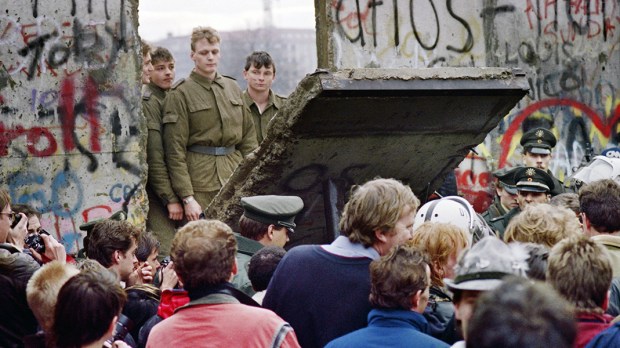Lenten Campaign 2025
This content is free of charge, as are all our articles.
Support us with a donation that is tax-deductible and enable us to continue to reach millions of readers.
On the 30th anniversary of the fall of the Berlin Wall, the Catholic Bishops of Europe expressed the desire that Europe be “moved by the Holy Spirit.”
“We invite all to pray to God, the Lord of History, that He might help us to devote ourselves to a Europe moved by [the] Holy Spirit, who is the root and foundation of hope and the source and power of a new commitment to those values Europe is built upon: justice, liberty and peace,” said a statement issued by the Bishops of the Commission of the Episcopates of the European Union (COMECE).
The Berlin Wall was built by East Germany in 1961 in order to stem the flow of skilled workers, professionals, and intellectuals fleeing to the West. Over the years, almost 200 people were killed trying to cross the wall.
But in 1989, changes began to take place in Eastern Europe, starting in Hungary. Poland had its first free elections in June. And East Germany’s hard-line communist leadership was forced from power in October.
The Encyclopaedia Britannica explains: “On November 9 the East German government opened the country’s borders with West Germany (including West Berlin), and openings were made in the Berlin Wall through which East Germans could travel freely to the West. The wall henceforth ceased to function as a political barrier between East and West Germany.”
“The fall of the Berlin Wall on the 9th of November 1989 was one of the most important events in European history of the last decades,” the COMECE statement said. “After having been separated by a concrete wall for more than 28 years, people—relatives, friends and neighbors—living in the same city were able to meet each other, to celebrate and to express their joy and hopes. From this moment on the world looked different.”
Citing Scripture, the bishops said that as Christians they acknowledge that it is Christ who “is our peace, who has made the two groups one and has destroyed the barrier, the dividing wall of hostility.”
“The fall of the Berlin Wall is not only an event of the past to be celebrated but has a prophetic dimension,” said COMECE, whose president is Cardinal Jean-Claude Hollerich S.J., of Luxembourg. “It has taught us that constructing walls between people is never the solution and it is a call to work for a better and more integrated Europe.”
Pope St. John Paul II, who grew up in a Poland that was dominated by Nazism and then communism, played an important role in bringing the latter’s dominance over Eastern Europe to an end, the bishops reminded readers.
But not all the expectations that the fall of the Berlin Wall brought forth have been fulfilled, they said. “It is also true that the ideologies that were behind the building of the Wall have not fully disappeared in Europe and are still present today in different forms,” the bishops warned.
We acknowledge that the process of healing and reconciliation is delicate and difficult,” they said. “Even today, for some of the victims of the oppressive regimes of the past this process is far from completed; their determination, commitment and suffering were decisive for the freedom Europe enjoys today. Yet, we want to revive and foster those signs of hope, those expectations for a better future in Europe and for all Europeans that guided that historic moment in November 1989. For this reason, as Christians and European citizens, we call upon all Europeans to work together towards a free and united Europe through a renewed process of dialogue across mentalities and cultures, respecting our different experiences of history and sharing our hopes and expectations for a common peaceful future.
To be able to do so, Europeans need to remember that a “culture of encounter implies the genuine capacity to listen first,” the Brussels-based COMECE said. “As Christians we are also called to preach and be witnesses of the Gospel, knowing that only in the mystery of the incarnate Word does the mystery of man take on light’ (Gaudium et Spes, 22).”

